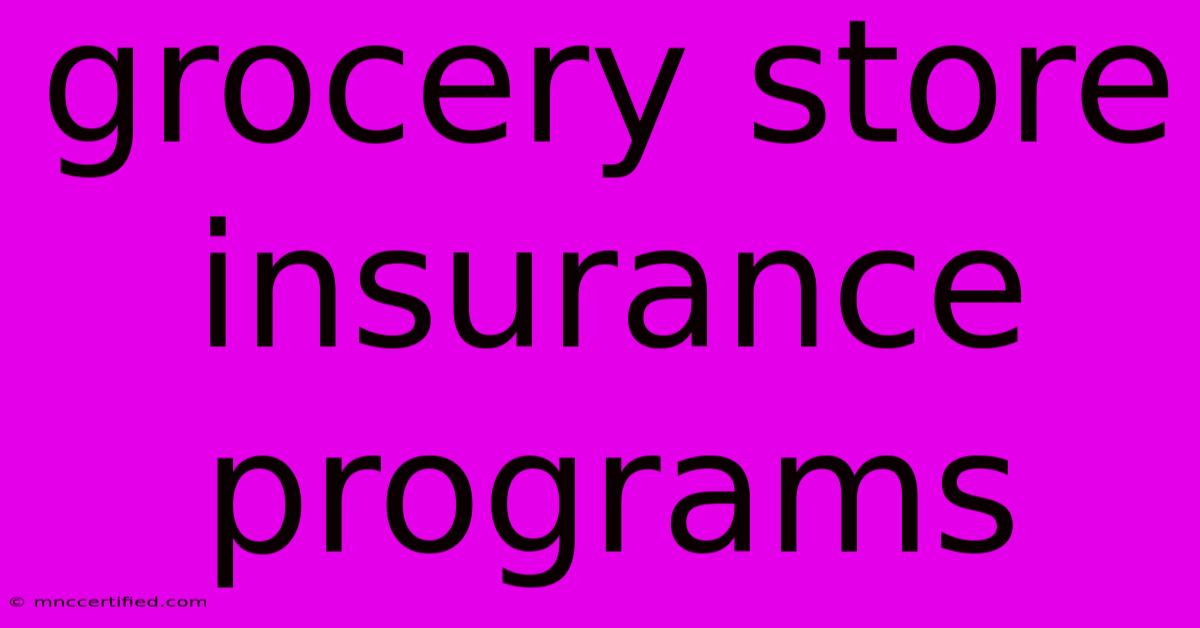Grocery Store Insurance Programs

Table of Contents
Grocery Store Insurance Programs: A Comprehensive Guide
Running a grocery store is a complex undertaking. From managing inventory and staff to ensuring customer satisfaction, there are countless moving parts. One crucial element often overlooked is comprehensive insurance coverage. This article explores the various insurance programs vital for protecting your grocery business and mitigating potential risks.
Understanding the Unique Risks of the Grocery Industry
Grocery stores face a unique set of risks compared to other businesses. These include:
- Food spoilage and contamination: This can lead to significant financial losses, product recalls, and even lawsuits. Spoilage insurance specifically addresses these issues.
- Slip and fall accidents: Wet floors, spills, and uneven surfaces create a high risk of customer injuries. General liability insurance is essential to cover medical expenses and legal costs resulting from such incidents.
- Theft and shoplifting: Grocery stores are unfortunately frequent targets for theft, both from employees and customers. Employee theft insurance and shoplifting insurance can help mitigate these losses.
- Property damage: Fire, floods, vandalism, and other disasters can cause extensive damage to your store and inventory. Commercial property insurance is crucial to cover repairs and replacements.
- Equipment breakdown: Refrigeration units, freezers, and other vital equipment are essential for maintaining inventory. Equipment breakdown insurance protects against the financial repercussions of malfunctions.
- Cybersecurity breaches: With increasing reliance on technology, grocery stores are vulnerable to data breaches that can expose customer information. Cyber liability insurance is becoming increasingly important.
- Workers' compensation: This insurance protects your employees in case of workplace injuries or illnesses, covering medical expenses and lost wages. This is often a legal requirement.
Key Insurance Programs for Grocery Stores
Let's delve into the specific types of insurance policies crucial for your grocery business:
1. General Liability Insurance: The Foundation
This is the cornerstone of any grocery store's insurance program. It covers bodily injury and property damage claims from third parties, including customers, visitors, and even delivery drivers. It also provides coverage for advertising injury and personal injury.
2. Commercial Property Insurance: Protecting Your Assets
This protects your physical building, inventory, equipment, and other assets against damage or loss from various perils, such as fire, theft, vandalism, and natural disasters. Consider endorsements for spoilage and contamination coverage.
3. Product Liability Insurance: Protecting Against Foodborne Illness
This critical coverage protects your business against claims related to foodborne illnesses or injuries caused by your products. This goes beyond basic general liability and specifically addresses risks associated with food safety.
4. Workers' Compensation Insurance: A Legal Necessity
This is usually mandated by law and covers medical expenses and lost wages for employees injured on the job. Failure to carry adequate workers' compensation insurance can result in significant penalties.
5. Commercial Auto Insurance: Protecting Your Fleet
If your grocery store operates delivery vehicles, you'll need commercial auto insurance to cover accidents and damages involving your company vehicles.
6. Business Interruption Insurance: Maintaining Operations After a Disaster
This insurance covers lost income and operating expenses if your business is temporarily shut down due to a covered event like a fire or natural disaster. This helps keep your business afloat during recovery.
7. Crime Insurance: Protecting Against Theft
This policy covers losses from employee dishonesty, shoplifting, and other criminal activities. Consider separate policies for employee theft and customer theft for granular coverage.
Choosing the Right Insurance Provider
Selecting the right insurance provider is crucial. Consider the following factors:
- Reputation and financial stability: Choose a well-established insurer with a strong track record.
- Coverage options: Ensure the policy covers all the risks your grocery store faces.
- Customer service: Look for a provider known for its responsive and helpful customer service.
- Price: Compare quotes from multiple insurers to find the best value for your money. However, prioritize comprehensive coverage over the cheapest option.
Proactive Risk Management: Beyond Insurance
While insurance is a vital protective measure, proactive risk management is equally important. Implement robust food safety protocols, train employees on safety procedures, and regularly inspect your premises to identify and address potential hazards. This proactive approach will minimize risks and potentially reduce insurance premiums.
By implementing comprehensive insurance programs and proactive risk management strategies, you can protect your grocery store from unforeseen circumstances and ensure its long-term success. Remember to regularly review your insurance needs as your business grows and evolves. Consult with an insurance professional to tailor a policy specifically to your business's unique requirements.

Thank you for visiting our website wich cover about Grocery Store Insurance Programs. We hope the information provided has been useful to you. Feel free to contact us if you have any questions or need further assistance. See you next time and dont miss to bookmark.
Featured Posts
-
Turn Crypto Into Cash Arcadia Ca
Nov 21, 2024
-
Does Flood Insurance Cover Docks
Nov 21, 2024
-
Richard Geres Today Show Controversy
Nov 21, 2024
-
Is Oxervate Covered By Insurance
Nov 21, 2024
-
When Cyclones Meet Rivers Weather Results
Nov 21, 2024